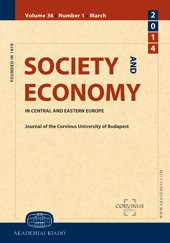Applying consumer responsibility principle in evaluating environmental load of carbon emissions
Applying consumer responsibility principle in evaluating environmental load of carbon emissions
Author(s): Zsófia Mózner VetõnéSubject(s): National Economy, Energy and Environmental Studies, International relations/trade, Economic development, Environmental interactions
Published by: Akadémiai Kiadó
Keywords: embodied carbon footprint; international trade; input-ouput analysis; household consumption;
Summary/Abstract: There is a need for a proper indicator in order to assess the environmental impact of international trade, therefore using the carbon footprint as an indicator can be relevant and useful. The aim of this study is to show from a methodological perspective how the carbon footprint, combined with input- output models can be used for analysing the impacts of international trade on the sustainable use of national resources in a country. The use of the input-output approach has the essential advantage of being able to track the transformation of goods through the economy. The study examines the environmental impact of consumption related to international trade, using the consumer responsibility principle. In this study the use of the carbon footprint and input-output methodology is shown on the example of the Hungarian consumption and the impact of international trade. Moving from a production- based approach in climate policy to a consumption-perspective principle and allocation, would also help to increase the efficiency of emission reduction targets and the evaluation of the ecological impacts of international trade.
Journal: Society and Economy. In Central and Eastern Europe ǀ Journal of the Corvinus University of Budapest
- Issue Year: 33/2011
- Issue No: 1
- Page Range: 131-144
- Page Count: 14
- Language: English

